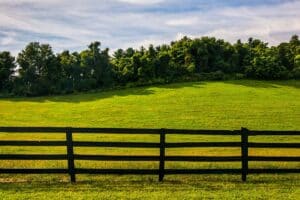By Mariwyn Evans of REALTOR Magazine
Whether you’re buying that perfect site for your future retirement home or investing in crop or timberland for a stable financial return, land offers a great place to keep your money safe and watch your investment grow.
And buying land is easier than you think—with the help of an Accredited Land Consultant of the REALTORS Land Institute.
The wide range of options under the “land” umbrella makes land an accessible purchase for almost every potential investor. Recreational timberland offers a good choice for long-hold investors since it combines periodic income from timber cutting with appreciation and the opportunity for personal enjoyment, says Benton Gibson, ALC, president of United Country Gibson Realty, McComb, Miss. Recent yearly returns on recreational timberland have averaged 8 percent in Gibson’s market, which are in line with national returns calculated by the USDA National Agricultural Statistics Service.
If one of your land-buying goals is purchasing a site for your future retirement home, now is a perfect time to take advantage of the market pressures on home builders to find a well-located lot at a great price. Rural land prices are also likely to accelerate as Boomers retire, notes Gibson. He cites a 2006 study by the National Association of REALTORS that found half of Boomers who live in an urban area would like to retire to a small town or rural area. Buying the land separately and not building until you’re ready to retire also helps keep costs down.
Developers’ financial distress may also produce some significant price reductions on land near the edge of current urban development, says Ray L. Brownfield, AFM, ARA, ALC, an associate broker with John Greene Land Company in Oswego, Ill. But these investments—although they have strong upside potential—are only for those with deep pockets and patience, since “there is little viable income compared to the total cost of the land,” he says.
Speculative development land also carries higher risk than many land investments since it’s difficult to predict when and where new home construction will occur, he adds. But if you buy right and have patience, this type of land investment can have a tremendous amount of upside, he says.
For investors seeking low volatility and reliable cash flows, Brownfield and many other land experts suggest concentrating on farm land.
“Good agricultural land in our market can yield a consistent 4 to 5 percent annual return. And since prices have stabilized this year after several years of appreciation, it’s a good time to invest,” he says.
Despite the ongoing financial crisis, funds are available for qualified farm land buyers. Interest rates remain near historic lows, and lending sources such as local community banks in rural areas and the Farm Credit System (www.farmcredit.com), a federally chartered network of borrower-owed lending institutions, are still offering loans for as much as 85 percent of purchase price with a 20-year amortization in early 2009.
If you already own other real estate investments, you can use a 1031 exchange to acquire land, says Brownfield. These exchanges permit real estate investors to trade one real estate holding for another but deter any capital gain taxes until the second asset is sold. (Note that 1031 exchanges have stringent rules, so consult an expert when considering an exchange.)
Another ready source of funds for land purchases is a ROTH or SEP IRA. IRS regulations permit individuals to use retirement funds to purchase real estate, including land, through an IRA custodian that offers real estate investments along with stocks and bonds.
“Several of my investors have contacted me recently to thank me for suggesting they diversify their retirement accounts into land holdings,” says Lou Jewell, ALC of Dan River Real Estate Inc., in Pilot Mountain, N.C. “Others have told me that they wish they’d diversified before they lost their money in the stock market. I tell those people that it’s not to late to invest in land. There are still great opportunities today.”
But while there is almost certainly a land investment to fit any investor, finding the property that fits each individual’s goals requires expert knowledge and experience. That’s why the smart first step in making any land purchase should be consulting with a professional land broker, preferably one that holds the Accredited Land Consultant (ALC) designation from the REALTORS Land Institute (RLI).
The ALC designation is conferred only on those land specialists who complete a rigorous education program and achieve a volume of successful land transactions, says Dan Hatfield, ALC, 2009 RLI president-elect and owner of Hatfield Realty in Medina, Texas.
As a professional membership organization, the REALTORS Land Institute serves the unique constituency of real estate professionals who broker, lease, sell, develop, and manage land assets. RLI offers superior education through its RLI Land University and professional development programs, an array of services that encourage networking and referral opportunities, and legislative advocacy on land-related issues through the National Association of REALTORS?.
“One of the real benefits of the REALTORS Land Institute is that whatever type of land you’re seeking, there are RLI members who are expert in that area,” says Gibson. “Whether your interest is shale oil leases, timber, or ranches, RLI members have the knowledge and resources to find the answers.”
This content may not be used or reproduced in any manner whatsoever, in part or in whole, without written permission of LANDTHINK. Use of this content without permission is a violation of federal copyright law. The articles, posts, comments, opinions and information provided by LANDTHINK are for informational and research purposes only and DOES NOT substitute or coincide with the advice of an attorney, accountant, real estate broker or any other licensed real estate professional. LANDTHINK strongly advises visitors and readers to seek their own professional guidance and advice related to buying, investing in or selling real estate.









Great article. The folks at the RLI really take their jobs seriously. If you take time to visit with one of their members they will really an impress you with their knowledge of the land business.